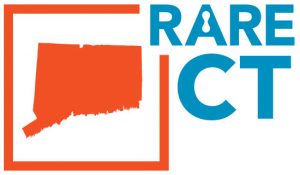Connecticut Rare Disease Day February 28
Members of Connecticut’s General Assembly (CGA) will hear from myriad people and organizations, including Sofia Sees Hope, about patient advocacy and access to treatment during a legislative informational session Thursday in Hartford, in celebration of Rare Disease Day 2019.
This year’s theme is Show Your Stripes, with a call to action for people to literally and figuratively “show their stripes” in support of rare diseases, according to the National Organization for Rare Disorders (NORD), the leading independent nonprofit organization representing the 25 million to 30 million Americans living with rare diseases.
The zebra, the official symbol of rare diseases in the United States, is noted for its black and white stripes that are central to its uniqueness. Everyone has his or her owns stripes, characteristics that make individuals distinct. While each of the more than 7,000 rare diseases are unique, many commonalities unite the rare disease community.
This event is held nationally and in more than 85 countries. It serves as an opportunity to hear from the many voices of those dealing with rare diseases and the daily challenges facing Connecticut patients and their families.
The public is invited to attend the event from 8:30 a.m. to 11 a.m. in the 2nd Floor Atrium of the Legislative Office Building, 300 Capitol Ave., Hartford.
Rare Disease Day in Connecticut is hosted by NORD and NORD’s Connecticut Rare Action Network (RAN). For more information, please visit their website and click on the “Register Here” link.
 Lesley Bennett, part of NORD’s Rare Action Network and Connecticut’s Volunteer State Ambassador, organized the Hartford event. For more information, please email her at Lesley.bennett@rareaction.org.
Lesley Bennett, part of NORD’s Rare Action Network and Connecticut’s Volunteer State Ambassador, organized the Hartford event. For more information, please email her at Lesley.bennett@rareaction.org.
Rare Disease Day – held annually on the last day of February – is a time to bring together doctors, researchers, advocates, patients, caregivers, industry representatives, and legislators in Connecticut and around the world to focus on the critical role patients play in understanding rare diseases and in developing innovative treatments and cures.
About 300,000 people in Connecticut have a rare disease. A disease or disorder is defined as rare in the United States when it affects fewer than 200,000 Americans at any given time, according to NORD.
Of the more than 7,000 rare diseases, NORD also says that 80 percent of rare diseases have genetic origins, while others are from infections (bacterial or viral), allergies, and environmental causes, or are degenerative and proliferative. Fifty-percent of rare diseases affect children.
Legislators and attendees will hear from Sofia Sees Hope about patient access to treatment during the “Patient Issues” portion of the program.
The moderator for Connecticut’s event is Dominic Cotton, a Milford resident with 25 years of experience in behavioral healthcare management. He is a parent and an active advocate for rare diseases and brain injuries.
Rose Avellino, NORD’s Grassroots Advocacy Manager, will open the event. Avellino helps with the nationwide Rare Action Network and state policy issues.
Here is Thursday’s agenda, followed by a list of scheduled speakers.
8:30 a.m.: Opening Remarks
8:40 a.m.: Connecticut General Assembly Welcome
9 a.m.: Rare Disease Programs and Research
9:40 a.m.: Rare Disease Business in Connecticut
9:50 a.m.: Impact of Rare Diseases on Connecticut Families
10:15 a.m.: Legislative Issues
10:25 a.m.: Patient Issues
10:40 a.m.: Closing Remarks
Speakers (in the order in which they will be speaking):
Representative Joe Aresimowicz, CGA House Speaker, recently introduced legislation concerning continuing medical education in screening for rare cancers. He is one of the Rare Action Network’s Champions.
Greta Stifle, Neuroendocrine tumor (NETs) patient and advocate, is the founder and president of STIFLE Cancer Foundation, Inc. She is a Neuroendocrine Tumor & Mast cell patient actively advocating for patients with rare cancers through campaigns, such as the Zebra Project and the Neuroendocrine Tumor Awareness Campaign.
Senator Len Fasano, CGA Senate Minority Leader, recently introduced two bills to assist patients and families with developmental disabilities and helped make Connecticut become one of the first states to add Adrenoleukodystrophy (ALD) to the Newborn Screening Panel. He is also a Rare Action Network Champion.
Hunter Pageau, a patient and advocate, is a Rare Action Network Youth Champion. He was born with an ultra-rare motor neuron disease – Spinal Muscular Atrophy with Respiratory Distress (SMARD). Despite his own medical challenges, Hunter actively raises his voice to advocate for others who have rare, life-limiting illnesses.
Ching Lau, MD, Ph.D., is the Division Head of Connecticut Children’s Medical Center’s (CCMC) Center for Cancer & Blood Disorders and professor of Genomic Medicine at the Jackson Laboratory (JAX Labs). He specializes in finding new treatments for children with rare blood, bone, and brain cancers.
Charles Whitaker, MD, is a neurologist who sees patients at the Hospital for Special Care (HSC) outpatient clinic. He specializes in researching and treating adult neuromuscular disorders
Cristian Ionita, MD, is Co-Director of the Yale/MDA Pediatric Neuromuscular Clinic and Assistant Professor of Pediatrics (Neurology). His research focuses on pediatric neuromuscular disorders.
Saquib Lakhani, MD, is Clinical Director of Yale Medicine’s Pediatric Genomics Discovery Program (PGDP). He specializes in caring for newborns and infants with undiagnosed birth disorders.
Paul Pescatello is President and CEO of the New England Biotech Association and chairs the Connecticut Business & Industry Association’s (CBIA) Bioscience Growth Council.
Dan Donovan is Co-Founder & CEO of rareLife solutions. His passion for improving life for those with rare diseases is based on personal and professional experience.
Erica Mumm, DNP, MSN, RN, is a Clinical Assistant Professor in the Quinnipiac School of Nursing, and the mother of a child with a rare genetic disorder called KCNQ2 encephalopathy.
Alissa DeJonge is a caregiver, Vice President of Research, Connecticut Economic Resource Center, Inc., and the mother of a 2-year-old with severe hemophilia.
Heather Knapp is a caregiver and mother of four; her youngest child, a 2-year-old boy, was identified at birth in the state’s newborn screening program with Phenylketonuria (PKU).
Father Nikolas Karloutsos is a caregiver for his daughter who has a BRAF mutation Rasopathy – probably Cardiofaciocutaneous (CFC) Syndrome, which causes marked behavioral health/cognitive issues.
Jennifer Ianuzzi is the caregiver for her child with Smith-Magnis Syndrome, a developmental disorder caused by chromosome 17 microdeletions. Besides congenital abnormalities, this syndrome causes behavioral health and cognitive issues.
Guyla Acsadi, MD, Ph.D., is the Division Head of Neurology at Connecticut Children’s Medical Center (CCMC) and Professor of Pediatrics and Neurology at the University of Connecticut School of Medicine. He has a Ph.D. in Molecular Genetics and expertise in neuromuscular medicine.
Colleen Brunetti of West Hartford has pulmonary arterial hypertension (PAH) and actively advocates for patients. She is a board member of the Pulmonary Hypertension Association.
Representative Jillian Gilchrest is a House Representative from West Hartford. She introduced bills addressing co-insurance assistance programs needed to help patients afford prescription medications.
Rosanne Smyle is a staff member of the Sofia Sees Hope patient advocacy organization – a global non-profit dedicated to improving the lives of those affected by rare inherited retinal disorders that cause blindness.
Donna Sciacca is Community Outreach and Education Manager for the Connecticut division of the American Liver Foundation. She is responsible for patient education programs and raising public awareness of liver diseases. She also serves on the Board of Donate Life CT, an organ donation and transplant coalition.
Jecy Belmont of Hamden is a patient and an advocate with the rare bile duct disease, Recurring Primary Sclerosing Cholangitis, and had to have a liver transplant. Despite his own health issues, Jecy works tirelessly to educate the public on liver-related health issues.
Representative Fred Camillo is a House Representative from Greenwich who advocates for rare pediatric blood cancers. For the last two years he has held Donna Marie Camillo’s Paws For A Cause Walk to Cure Childhood Leukemia to honor his sister who died of a pediatric blood cancer.
Danielle Delgado, a patient and advocate, is a Rare Action Network Youth Champion. She has been diagnosed with two rare diseases (von Willebrand and Ehlers Danlos) and works to bring joy to other children who are ill.

